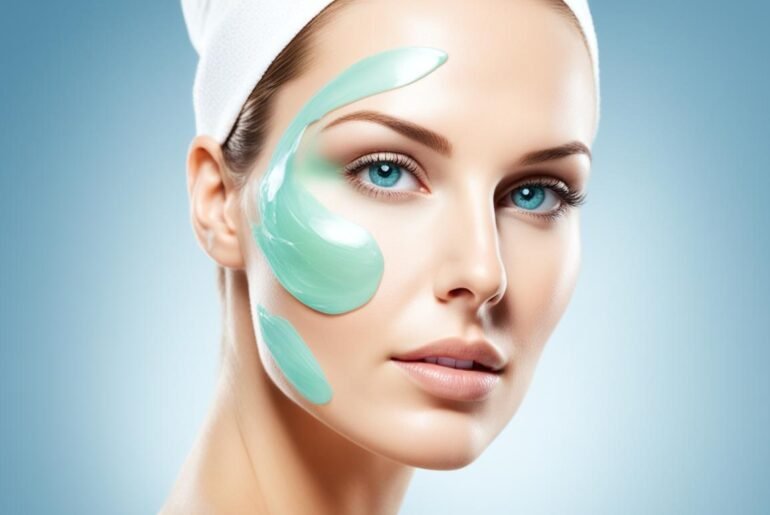
Did you know that incorporating omega-3 fatty acids into your diet can give your skin a radiant glow? Omega-3s have been gaining recognition for their incredible benefits for skin health and appearance. These essential nutrients, found in foods like fish oil and seafood, have the power to transform your complexion and leave you with a healthy, vibrant glow.
Omega-3 fatty acids work wonders for the skin by regulating oil production, improving hydration, reducing breakouts, and minimizing signs of aging. They can also soften rough, dry skin and soothe irritation and dermatitis. But that’s not all – research suggests that fish oil intake may even boost the skin’s immunity to UV damage and skin cancer.
If you’re looking to achieve a healthy complexion and a brighter, more youthful appearance, then omega-3 fatty acids are your secret weapon. Discover the amazing ways these nutrients interact with your skin and how you can incorporate them into your daily routine for maximum benefits.
Key Takeaways:
- Omega-3 fatty acids can regulate oil production, improve hydration, and minimize signs of aging
- They have a soothing effect on rough, dry skin and can help reduce irritation and dermatitis
- Fish oil intake may boost the skin’s immunity to UV damage and skin cancer
- Incorporating omega-3s into your diet or through supplements can lead to a healthier and more radiant complexion
What are Omega-3 Fatty Acids and their Effects on Skin?
Omega-3 fatty acids are essential nutrients that play a crucial role in maintaining the health of our skin. These beneficial fats can be found in certain foods such as fish oil, seafood, flax seeds, and chia seeds. Omega-3s offer a wide range of benefits to the skin, helping to improve its overall appearance and quality.
One of the key effects of omega-3 fatty acids on the skin is their ability to regulate oil production. By balancing the production of sebum, omega-3s can help prevent excessive oiliness that leads to clogged pores and breakouts. This can be especially beneficial for individuals with oily or acne-prone skin.
In addition to regulating oil production, omega-3 fatty acids also improve skin hydration. These fats help to strengthen the skin’s natural moisture barrier, preventing water loss and maintaining optimal hydration levels. As a result, the skin becomes more plump, supple, and dewy.
“Omega-3 fatty acids have a soothing effect on rough, dry skin and can help reduce irritation and dermatitis.”
Omega-3s are also known for their anti-inflammatory properties, which can help to calm inflamed or irritated skin. Whether caused by conditions like eczema or environmental aggressors, omega-3 fatty acids have been shown to reduce redness, itching, and discomfort. This makes them beneficial for individuals with sensitive or reactive skin.
Furthermore, research suggests that omega-3s can enhance the skin’s natural defense mechanisms against UV damage and skin cancer. These fats have been found to improve the skin’s resilience to the harmful effects of sun exposure, reducing the risk of sunburn, premature aging, and skin cancer development.
Overall, incorporating omega-3 fatty acids into your diet or skincare routine can be highly beneficial for your skin. These essential nutrients offer a range of effects, including regulating oil production, improving hydration, soothing irritation, and protecting against UV damage. By nourishing your skin from within, omega-3s can help you achieve a healthier, more radiant complexion.
| Effects of Omega-3 Fatty Acids on Skin |
|---|
| Regulate oil production |
| Improve hydration |
| Reduce breakouts |
| Soothe rough, dry skin |
| Minimize signs of aging |
| Reduce irritation and dermatitis |
| Enhance skin’s immunity to UV damage and skin cancer |
Food Sources of Omega-3 Fatty Acids

When it comes to incorporating omega-3 fatty acids into your diet, there are various food sources to choose from. The most well-known and readily available source is fish oil. Fish such as salmon, mackerel, and sardines are rich in omega-3s, making them an excellent choice for those seeking to boost their intake of these essential fatty acids.
If you prefer a vegetarian option, there are plant-based sources of omega-3s as well. Flax seeds, chia seeds, and soybean oil are popular choices. These plant sources contain alpha-linolenic acid (ALA), a type of omega-3 fatty acid. However, it’s important to note that the body needs to convert ALA into the active forms of omega-3s found in fish oil, namely eicosapentaenoic acid (EPA) and docosahexaenoic acid (DHA).
“Including a variety of omega-3-rich foods in your diet is key to reaping their many health benefits.”
The table below provides a summary of some common food sources of omega-3 fatty acids:
| Food Source | Omega-3 Fatty Acid Content |
|---|---|
| Fish Oil | High in EPA and DHA |
| Salmon | High in EPA and DHA |
| Mackerel | High in EPA and DHA |
| Sardines | High in EPA and DHA |
| Flax seeds | Source of ALA |
| Chia seeds | Source of ALA |
| Soybean oil | Source of ALA |
It’s important to maintain a balanced diet and consult with a healthcare professional to ensure you are meeting your specific omega-3 fatty acid needs. Including a variety of omega-3-rich foods in your diet is key to reaping their many health benefits.
How Omega-3s Interact with the Skin
Omega-3 fatty acids play a crucial role in improving the health and appearance of the skin. These essential nutrients have a direct interaction with the skin, leading to a host of benefits.
One of the key ways in which omega-3s benefit the skin is by improving the fatty acid composition. They help to maintain a healthy balance of omega-3 and omega-6 fatty acids, which is essential for optimal skin health. This balance promotes softer and less inflamed skin, reducing the occurrence of dryness and irritation.
Omega-3s also have a significant impact on the skin’s inflammatory response. They possess anti-inflammatory properties that can help calm and soothe the skin, reducing redness and inflammation. By keeping the levels of fatty acids in the skin balanced, omega-3s can minimize the effects of sun damage and improve sensitive skin conditions.
Furthermore, research suggests that omega-3s may enhance the skin’s immunity to UV damage and skin cancer. By bolstering the skin’s defense mechanisms, these fatty acids contribute to maintaining healthier skin and reducing the risk of skin-related issues.
“Omega-3 fatty acids have a direct interaction with the skin, leading to a host of benefits.”
Omega-3s and Skin Health:
- Improves fatty acid composition
- Reduces inflammation
- Minimizes sun damage
- Enhances the skin’s immunity
By incorporating omega-3s into your diet through foods rich in these fatty acids, such as fatty fish or supplements, you can effectively support your skin’s health and appearance.
To further illustrate the interaction between omega-3s and the skin, consider the following table:
| Interaction | Benefits |
|---|---|
| Improves fatty acid composition | Promotes softer and less inflamed skin |
| Reduces inflammation | Calms and soothes the skin, reducing redness and irritation |
| Minimizes sun damage | Helps protect the skin from harmful UV rays |
| Enhances the skin’s immunity | Strengthens the skin’s defense mechanisms |
As shown in the table, the interaction between omega-3s and the skin yields various benefits, from improved skin texture to enhanced protection against environmental aggressors.
By understanding how omega-3s interact with the skin, you can make informed choices to support your skin’s health and achieve a more radiant and youthful complexion.
Recommended Omega-3 Intake for Skin Benefits

When it comes to reaping the skin benefits of omega-3 fatty acids, there is no one-size-fits-all recommendation for how much you need. However, health experts suggest that adults should aim for a daily intake of 500 mg of omega-3 or two servings of fatty fish per week to see improvements in overall wellness and skin health.
Omega-3 fatty acids, found in foods like fish oil and seafood, offer a wide range of benefits for the skin. They help regulate oil production, improve hydration, reduce breakouts, and minimize signs of aging. These essential nutrients can also soften rough, dry skin and soothe irritation and dermatitis. Research even suggests that omega-3s may enhance the skin’s immunity to UV damage and skin cancer.
To ensure you are getting enough omega-3s to support your skin health, consider incorporating fatty fish like salmon, mackerel, and sardines into your diet. If you prefer plant-based sources, flax seeds, chia seeds, and soybean oil are good options, although they may not be as readily absorbed by the body as fish oil.
Incorporating omega-3s into your daily routine can lead to a healthier and more radiant complexion. Whether through dietary changes or supplements, prioritize getting enough omega-3 fatty acids to maintain optimal skin health and enjoy the many skin benefits they offer.
Common Myths About Omega-3 Fatty Acids
There are several common myths surrounding omega-3 supplementation. Let’s address some of the most prevalent misconceptions:
Myth 1: All fish are a good source of omega-3s
This myth assumes that any type of fish can provide an equal amount of omega-3 fatty acids. In reality, different fish species contain varying levels of nutrients, including omega-3s. For example, fatty fish like salmon, mackerel, and sardines are excellent sources of omega-3s, while other fish may have lower concentrations. It’s important to choose fish that are rich in omega-3s to maximize the benefits.
Myth 2: Plant sources of omega-3s offer the same benefits as fish oil
While plant sources like flax seeds and chia seeds do contain omega-3 fatty acids, they are not as efficient as fish oil in providing the same benefits for the skin. Fish oil contains the specific components necessary for optimal skin health, such as EPA and DHA. Plant-based omega-3s need to be converted by the body, making them less readily available for absorption.
Myth 3: Any size of fish is safe to consume
Consuming fish that are high in mercury can be detrimental to your health. Mercury can accumulate in larger fish species, such as shark, swordfish, and king mackerel. To minimize mercury exposure, it is recommended to consume smaller fish like salmon, sardines, and trout, as they contain lower levels of mercury.
By debunking these myths, we can ensure that individuals make informed choices about omega-3 supplementation, optimizing their skin and overall health.
| Myth | Fact |
|---|---|
| All fish are a good source of omega-3s | Different fish have different levels of omega-3 fatty acids. |
| Plant-based omega-3s provide the same benefits as fish oil | Fish oil contains the essential components for optimal skin health. |
| Any size of fish is safe to consume | Mercury levels can vary in different fish species. Smaller fish tend to have lower mercury levels. |
Considerations When Consuming Omega-3s

When it comes to reaping the benefits of omega-3 fatty acids, it’s important to consider a few key factors. Not all omegas offer the same advantages, and the presence of omega-6 fatty acids can impact the effectiveness of omega-3s. To ensure optimal results, here are some considerations to keep in mind:
- Aim for a balanced diet: Consuming a well-rounded diet rich in a variety of nutrients is essential for overall health and well-being. When incorporating omega-3s into your diet, it’s important to strike a balance with other essential fatty acids, such as omega-6s. While omega-3s have numerous benefits, excessive intake of omega-6s can counteract their positive effects. Therefore, focus on maintaining a healthy balance between omega-3 and omega-6 fatty acids to maximize the benefits.
- Choose the right sources: To ensure you’re getting the most out of your omega-3 intake, it’s crucial to select high-quality sources. While fish oil is a well-known and highly effective source of omega-3s, not all fish contain the same levels of these beneficial fatty acids. Opt for fatty fish like salmon, mackerel, and sardines, which are rich in omega-3s and low in contaminants like mercury. If you follow a vegetarian or vegan diet, consider incorporating plant-based sources of omega-3s such as flax seeds, chia seeds, and soybean oil. However, it’s important to note that plant sources may not provide the same benefits as fish oil, as they may require conversion within the body.
- Consult with your healthcare professional: If you have specific health concerns or are considering omega-3 supplementation, it’s always wise to consult with a healthcare professional. They can provide guidance tailored to your individual needs and help you determine the appropriate dosage and form of omega-3 supplementation, whether through diet or supplements.
By considering these factors, you can make informed choices when it comes to consuming omega-3s and maximize their potential benefits for your overall wellness and skin health.
Expert Quote:
“Finding the right balance between omega-3 and omega-6 fatty acids is crucial for reaping the full benefits of omega-3s. Aim for a diverse diet, select high-quality sources, and consult with a healthcare professional to ensure you’re getting the most out of your omega-3 intake.” – Dr. Sara Johnson
| Considerations | Omega-3 Intake | Omega-6 Intake |
|---|---|---|
| Purpose | Maximize benefits of omega-3s | Balanced intake to prevent adverse effects |
| Source | High-quality fish oil or fatty fish | Sources like vegetable oils, processed foods |
| Dosage | In consultation with a healthcare professional | Avoid excessive intake |
Omega-3 Fatty Acids for Skin and Hair Benefits

In addition to the numerous benefits omega-3 fatty acids provide for the skin, emerging research suggests that they may also have positive effects on wound healing, skin cancer risk reduction, and hair health. While further studies are needed to confirm these effects in humans, the potential advantages are promising.
Omega-3 fatty acids have been found to accelerate wound healing by reducing inflammation and promoting tissue repair. They can help to enhance the body’s natural healing process, leading to faster recovery and minimized scarring.
Furthermore, omega-3s may play a role in reducing the risk of skin cancer. Several studies have indicated that these essential fatty acids possess protective properties against skin cancer development caused by UV radiation. Omega-3s help to counteract the oxidative stress induced by sun exposure, reducing the risk of DNA damage and the subsequent formation of skin tumors.
In addition to their potential benefits for the skin, omega-3 fatty acids have also been linked to improved hair health. The essential fatty acids found in omega-3s nourish the hair follicles, promoting stronger and healthier hair growth. These fatty acids also help to reduce hair loss by maintaining a healthy scalp environment and supporting the hair growth cycle.
While omega-3 fatty acids show promise for enhancing both skin and hair health, it’s important to note that further research is necessary to fully understand their mechanisms of action and specific benefits for these areas. However, incorporating omega-3-rich foods such as fish, flax seeds, and chia seeds into your diet can potentially contribute to improved skin radiance and stronger, healthier hair.
Conclusion
In conclusion, incorporating omega-3 fatty acids into your diet or through supplements can have a transformative effect on the health and appearance of your skin. By regulating oil production, improving hydration, and reducing breakouts, omega-3s help to create a healthier and more radiant complexion.
Not only do omega-3s minimize signs of aging, but they also soothe rough, dry skin and improve irritation and dermatitis. These fatty acids have been shown to have a positive impact on the skin’s immune response, providing protection against UV damage and reducing the risk of skin cancer.
Whether obtained from fish oil or plant sources like flax seeds and chia seeds, omega-3s offer significant benefits for the skin. By including these essential nutrients in your daily routine, you can enjoy a glowing, youthful complexion and promote overall skin health.
FAQ
What are the benefits of omega-3 fatty acids for the skin?
Omega-3 fatty acids have numerous benefits for the skin, including regulating oil production, improving hydration, reducing breakouts, and minimizing signs of aging. They can also soothe rough, dry skin and improve irritation and dermatitis.
What are the food sources of omega-3 fatty acids?
The most well-known food source of omega-3s is fish oil. Other vegetarian sources include flax seeds, chia seeds, and soybean oil. However, omega-3s from fish oil are more readily absorbed by the body compared to plant sources, which need to be converted first.
How do omega-3 fatty acids interact with the skin?
Omega-3s improve the fatty acid composition in the skin and balance its inflammatory response, leading to softer and less inflamed skin. By keeping fatty acid levels up, omega-3s can minimize the effects of sun damage and improve sensitive skin conditions.
What is the recommended omega-3 intake for skin benefits?
There is no set recommendation for how much omega-3 you need, but health experts suggest adults should aim for 500 mg per day or two servings of fatty fish per week in order to see improvements in overall wellness and skin health.
What are some common myths about omega-3 fatty acids?
One common myth is that any fish is a good source of omega-3s, when in reality, different fish contain different levels of nutrients. It is also important to consume smaller fish to avoid high mercury levels. Additionally, plant sources of omega-3s do not provide the same benefits as fish oil, as they lack the necessary components.
What should I consider when consuming omega-3s?
It is important to ensure that your diet is balanced and that you are not consuming excessive omega-6 fatty acids, as high levels of omega-6s can decrease the effectiveness of omega-3s. It is also important to choose fish oil supplements that have been tested for purity and quality.
What are the skin and hair benefits of omega-3 fatty acids?
In addition to skin benefits, omega-3s may accelerate wound healing, reduce the risk of skin cancer, and promote hair growth while reducing hair loss. However, further research is needed to confirm these effects in humans.



